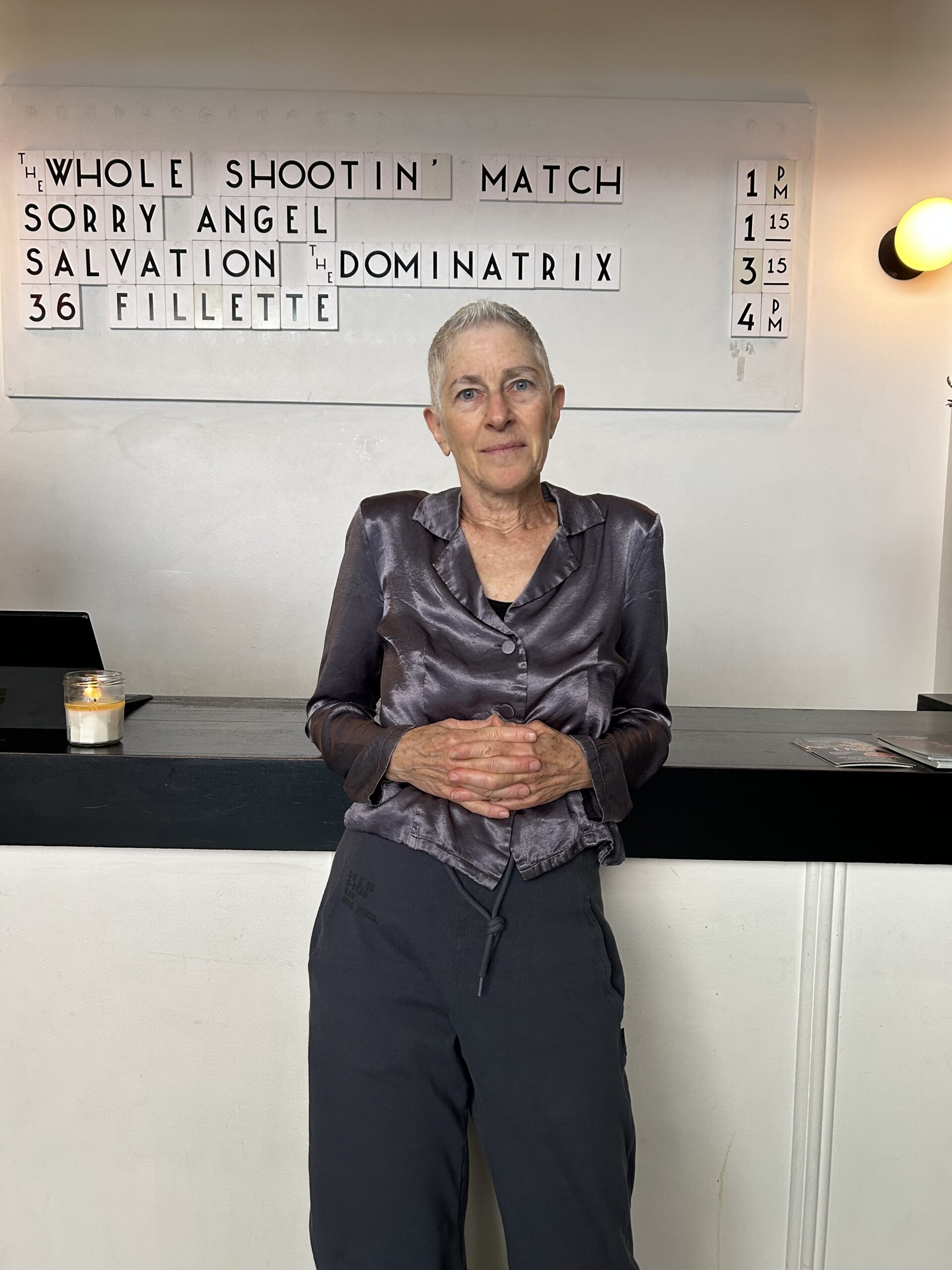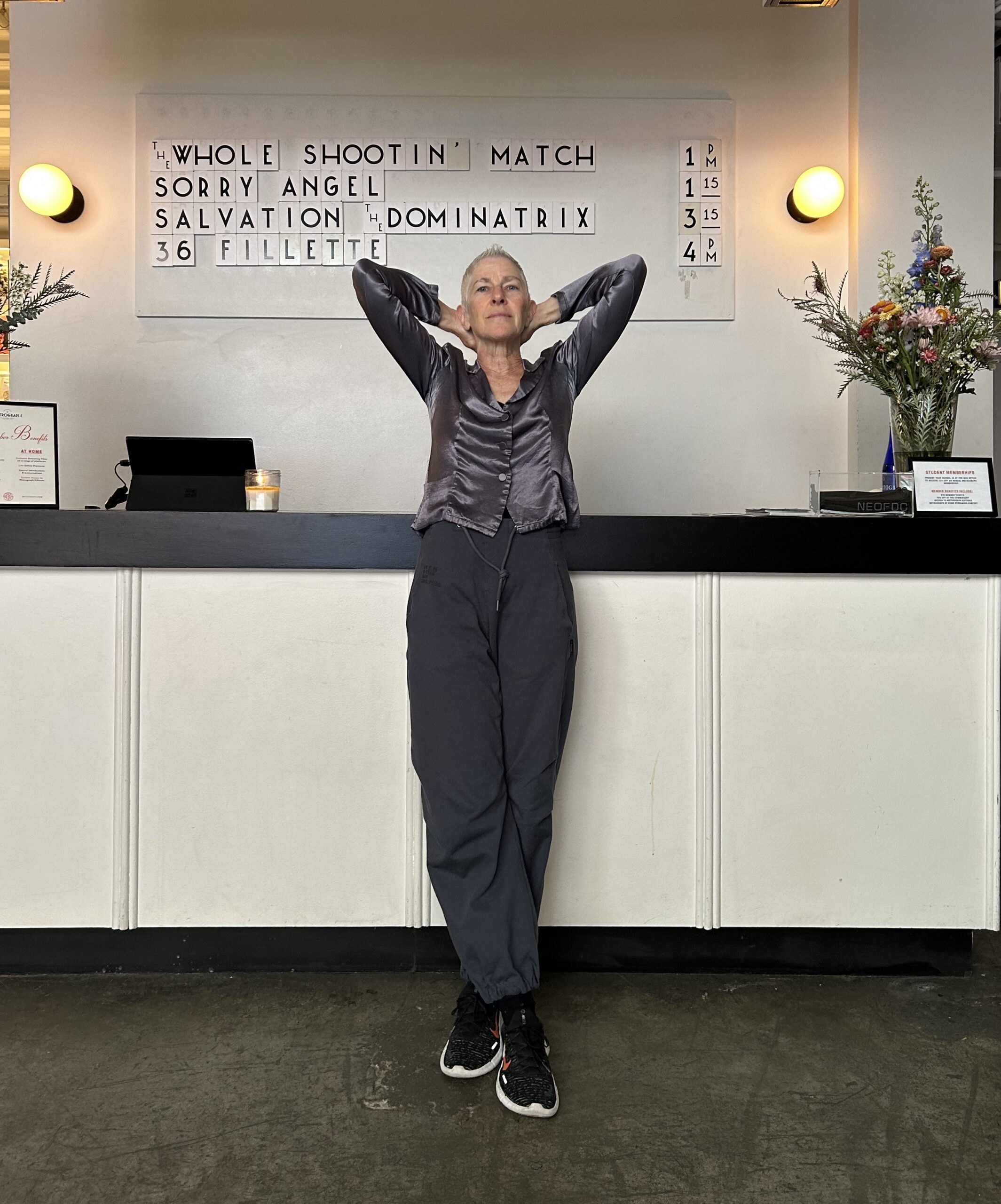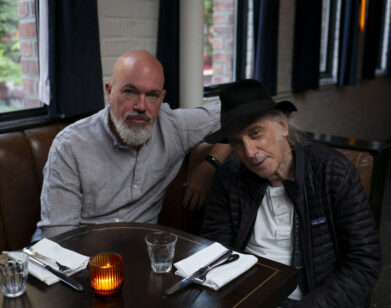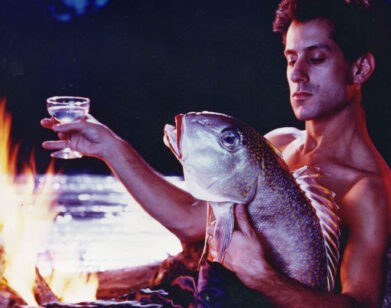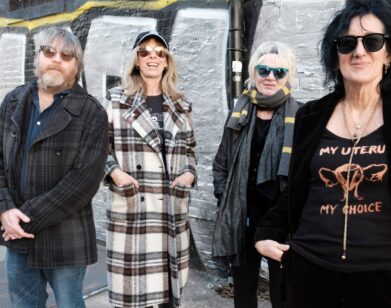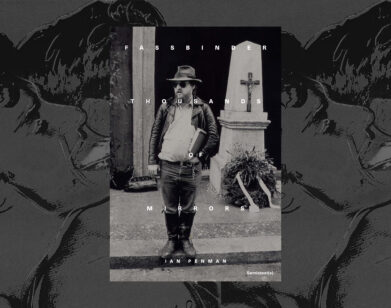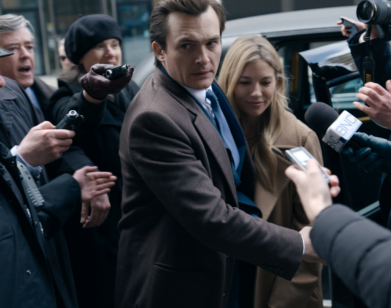DIRECTOR
“Trauma, Trauma, Trauma!”: Filmmaker Beth B Finally Gets Her Flowers
After 45 years of filmmaking, Beth B is still focused on the present. The influential director helped channel what she calls the “rage” of the iconic NYC No Wave scene into the movies with such force that her neon-soaked music video for “The Dominatrix Sleeps Tonight” wasn’t allowed on MTV in 1984. Moving effortlessly between documentary, experimental, and narrative (often blending all three), her films tell potent stories about institutional power and heteropatriarchal control with bite, humor, and explosive creativity. Now, as Metrograph’s “Sex, Power and Money: Films by Beth B” series demonstrates, her films–many of which explore questions of transphobia, domestic violence, and religious overreach, the kinds of burning subjects she says drive her “addictive” artistic practice–still feel urgent and immediate. Over the weekend, at Metrograph, Beth B sat for a cathartic conversation about the female gaze, art’s power to challenge social norms, and what the filmmaker calls the “Now Wave.”—PAYTON McCARTY-SIMAS
———
LENT: Hi, Beth.
B: Hi.
LENT: Who is Beth B? Or rather, what brings you to Metrograph today?
B: Well, if I tried to tell you my life story, we would be here for days.
LENT: Of course. We’ll get into that.
B: Good. So the Metrograph is doing a retrospective of my films from—well, the 45 years that I’ve been making films. I just can’t stop. It’s like my addiction. It’s a really phenomenal way of charting my journey through life. My films are, in some ways, very autobiographical. Even though they are not about me, they usually have some intense questions that I’m trying to work out in my life that the films somehow evolve from. And half the time, I don’t even know that when I’m starting to make a film, I just know I have a burning desire.
LENT: To do what?
B: To do something. [Laughs]
LENT: [Laughs] Certainly. Obviously, so much of your early work is about this sense of a “scene.” The punk scene, No Wave. A lot of them are collectives, groups of people doing one thing. What about these spaces do you think is ripe for filmmaking?
B: Well, the films of No Wave were 40 years ago. So I have come to the Now Wave in my life. I don’t work in groups or with collectives or collaborations anymore, except when I collaborate, as I often do with musicians. I have a 27-year collaboration with Jim Coleman. He was with Cop Shoot Cop, and the band Human Impact. I’ve worked with Swans, New Order, Cabaret Voltaire, a slew of music people. Collaboration was very important when I was really young, and there was a scene in New York City. It was a convergence of people coming to New York City without money, lost, escaping the disasters of the family, coming into a landscape that was completely devastated. So in a way it was like, “Oh, I don’t have anything to lose.” And that was the attitude that I brought to filmmaking, “I don’t need to know anything, I just need to tap into what is inside myself, and scream as loudly as I can.” Because when I was in my family, I couldn’t express—and be—who I wanted to be. In New York in the late seventies, everybody was searching for who they were. So within that search came a desire to express oneself. And I think the most profound thing at the time was that people started to really move against specialization. And that is what exploded this concept of collaboration. “Oh, I’m a musician today. Oh, I’m going to do theater tomorrow. Oh, I think I’m going to try a little film.” And you could bring people in to support what you were doing. It was anti-everything, and we were trying to revolutionize the concept of being creative.
LENT: Of course.
B: So I went to art school. But after I got out, I realized the precious white walls of the galleries were not what I was interested in. I wanted to be out on the streets. Now, my filmmaking has always been about power and control, and confronting the oppression of the patriarch. It’s definitely from a female point of view, it’s about the female gaze, and that’s why most of my films have very powerful women. Take Two Small Bodies. She’s a mother of two children who have disappeared, and she’s accused of murdering them. And when the cop comes to investigate, she’s basically convicted already [because] she’s kind of a slut and a whore.
LENT: Right.
B: Those representations of women, this whole concept of good or bad, “the Madonna, the whore,” these categories that the media always wants to put women into is what I am really rebelling against. Again I love now because there’s a merging of the genders. I can feel masculine today, feminine tomorrow, whatever the next day. I desire to cooperate and to—no, not cooperate because I’m not a compromising person at all. Whereas before, I was in such a rage that I just wanted to smack whoever came in range of me. In the early days, my rage definitely informed my films. Well, it always informed my films because women and outsiders of all races, and the people who are outside of the “normal,” continue to struggle. And so I want to voice the unheard. I want to show the unseen and embrace it.
LENT: That’s beautiful. My first question was about collectives, but I nevertheless feel that so much of your work is so truly about incredible individuals. But in a very different way, your work is also very much about large structures of power.
B: Yes. I also do a lot of fine arts work, and large scale installations with video. And often those look at those institutions that some people find themselves in. Because we are in institutions in a way: under someone else’s control and rules from the time we are born. So I find that posing questions about what our part is in a structure, in an institution—whether it’s a prison, an insane asylum, a school, educational system, or—a marriage! Or just a mother and child relationship, everything you do in life has to do with some kind of power structure.
LENT: Right.
B: And so I’m fascinated by it because I have historically had a really big ego. I know what I want to do, I know what I want to say.
LENT: And that’s why you’re here today!
B: [Laughs] And you know this, I’m a director. But it doesn’t really fly to behave that way your entire life. So I’ve had to look at being more open, to actually listen to other people’s opinions and value them. And that informs my work so much. And so always within one of these structures that I’m investigating, yes, there is the individual or individuals, and I often want to see things from different perspectives. But I think the films that I’m working on most recently, they’re exploring the depths to which people struggle with a kind of emotional pain. And I am trying to understand how different people navigate that. And so from my film, Lydia Lunch: the War is Never Over, it’s a lot about Lydia Lunch’s musical oeuvre, her phenomenal performance art, her spoken word. With someone like Lydia, you have to go beyond the surface. Personally, for me, Lydia is like an excavation site. I’m trying to discover things about the people who I’m filming. But I’m not interested in just doing a biopic of anybody.
LENT: Of course not.
B: I’m attracted to very dark, edgy subjects because I have that within myself, coming from the family I did. And even though we think, “Oh, I’ve dealt with this. I’ve dealt with that…”
LENT: Right.
B: You’re in the world and there are all sorts of things that trigger you. And you’re going like, “Oh, fuck. Why did I react that way? Oh no, I don’t want…” But I am staying within this realm. People ask “Why? Why do you keep doing films about such disturbing shit?” But it keeps me honest, in a way. It helps me to see myself with a clearer lens by knowing that no matter what anybody has done, whatever they’ve been through, all the shit, they’re still human. The struggle goes on until we’re dead. You know?
LENT: Don’t I know it! Don’t you know it.
B: I just did this film with Little Annie. It’s a beautiful poetic portrait, but it’s about fucking hard shit. You know? Drug addiction, the loss of a loved one, not showing up for that loved one when you should be there. Not you, of course. But she’s supposed to be there and she is shooting up in the bathroom because she’s got to get her fix because that is an obsession that is very hard to release oneself from, but there is a beauty in that struggle.
LENT: So towards the beginning of War’s Not Over, [Lunch] says the line that gives this retrospective its name: “Everything is about sex. No, everything’s about power.” I’m paraphrasing. I’m just curious to know you go about capturing those small moments within the context of these much larger themes, or larger obsessions.
B:B: With film, it’s like you’re constructing a panoramic building in a way. So all small details are really important, from the lighting to the setting to the costumes to the actors or the performers. And I am a stickler for how it will look visually, because I feel that the visual sensibility and aesthetic is an echo of the content, and often the emotional content. That’s why I love film because you have all of these creative tools in your hands, and it’s how you put it together, and what choices you make that really create the bigger picture. When I do a narrative film, all of those things come into play. Like with Two Small Bodies, the way it’s lit, or even with the new film, Glowing Annie, the shots are so lush and stark. She is in nature, but what she’s talking about is the unnatural acts that she finds herself within, or the impulses that she finds herself going deeper and deeper into. And so it’s the exploration of how to put things together. And often, it’s the editing. I love to edit.
LENT: Yes! Oh my god.
B: Especially with documentary film and experimental film, that’s where I find the story half the time. I can come to a project with what I think it’s going to be. But it’s until I have the footage—there, I figure out, “Oh, wait a minute. This is the bigger picture story. But then there are all these subtexts that are within that.” And I have to first seduce my audience in. Like I said, I used to smack them in the face til they were down on their knees. And then I would offer them up, what is it? Well, I don’t want to say content. Because today, “content” means something entirely different.
LENT: [Laughs] It’s horrifying. There’s so many words like that now. “Like,” “follow,” “content,” like you said.
B: I know. It’s all been corrupted. So now I’ve lost my train of thought.
LENT: That’s okay.
B: Generally, it’s the edge. I want people to go to the edge of their mind, and I want to challenge people’s comfort zones because that’s when we ask ourselves questions. I think a lot of my films do that. I recently brought three Vietnam veterans back to Vietnam with their adult children.
LENT: What is this project? I don’t think I’ve seen it yet.
B: That film is called Breathe In/Breathe Out. But the reason I’m bringing it up is because I came with an idea of what I wanted to do. The focus was, of course, intergenerational trauma from war. And what happened when we were there, it was beyond my imagination. I could never have constructed any kind of script like what we would experience there. Sometimes, I have to suspend my expectations, because if I have strict expectations on what a film is going to be, that’s a place of inflexibility. And I want to be in a fluid place so that I can receive the gifts that I’m given when I’m filming.
LENT: Oh, that’s beautiful.
B: So with Salvation! We were showing that tonight. Salvation!: Have You Said Your Prayers Today? I mean, that came out… well, it was a long time ago. In the eighties, when suddenly these fucking televangelists were taking over America, and nobody seemed to know it except the evangelists.
LENT: Right. And they were ready to spread the good word.
B: Oh my god. I was like, “I’m going to do some investigating.” I went to Jerry Falwell’s church, the Super Conference, and I found myself so frightened that when he said, “Get down on your knees,” I got down on my knees. I was afraid someone was going to shoot me! Because I’m the enemy. So that film, Salvation! is based on that experience.
LENT: Salvation! was one that I consciously did not get to because I’m going to the screening downstairs tonight with my friend Payton, who was a huge help with my research for this piece. And I am really excited to see it in the way it’s meant to be seen and not on my laptop screen.
B: Well, we’re showing four films in the theater, and then the rest of the films, including these, will be online. So I want to promote that. Luckily, we have Kino Lorber, who has restored all of my films and acquired all of them. And I am just so grateful for that. Salvation! is a wild film. I mean, just the pace of it. I watched it a few months ago. I hadn’t watched it in decades. I was like, “Wow, holy shit! How did I make this fucking wild film?” Because it’s really insane. It is.
LENT: I can’t wait.
B: It’s also just so hilariously funny. Well, actually not funny, sadly, because it was so prescient that the same shit is still happening now. And worse.
LENT: And worse. I think there’s so much more I want to ask you. So much of the work is about queerness, transness, religion, war, and obviously, those are the prevailing themes of society throughout all time. But I feel like your films are necessary right now.
B: Thank you.
LENT: And this is such an art world cliche now, that something “is needed now more so than ever.” But I truly do believe that.
B: I think the subjects that my films delve into, queerness, trans[ness], war, sex. Trauma, trauma, trauma! Emotional disturbance, insanity. All these subjects, they’re lifelong. Since the cave, these things have affected us. But I think especially right now, it’s critical to see films like mine, and other people’s films, because all we get is the mass media. What is “curated,” and censored, and sent to our feeds to feed us junk, to feed us shit, to feed us what the norm is supposed to be.
LENT: Certainly.
B: It’s like, “Oh, it’s acceptable now so we don’t really need to deal with it.” But the people who are going through these kinds of things that I talk about in my films, there will be millions and millions more people going through this kind of stuff, of being the outsider, of being the one who is feeling like, “Why was I put on this planet? I don’t know if I can survive.” The films invite people who aren’t comfortable to sit next to someone who might feel the same way.
LENT: Yeah, that’s really beautiful.
B: What touched you about that?
LENT: Well, the idea of sitting next to someone who’s experienced these things in the film, and someone who hasn’t. Because in some ways I try to separate all the things that have happened to me in my past and the person that I am now. In a way, I feel like I’m both of those people sitting at the theater. And both of my selves can watch your films together. And I wish that I had discovered you earlier, but I kind of don’t, because I think this is a perfect moment.
B: It’s never too late. And the other thing is, always put your arm around that younger part of you, and hug them, and accept them. I know it made me really sick, to not acknowledge the pain and disturbance, and how just horribly uncomfortable and how unaccepted I felt I was as a young person. And so I always pushed that younger part of me away until I did a lot of therapy. So now I’ve evolved to the point where I can be like, “Beth, put your arm around them.” That small child, and that small teenager, and give them a hug. And then suddenly I’m not those two separate people. I am a whole.
LENT: Wow, I’m going to end it there. Thank you for this, Beth.

